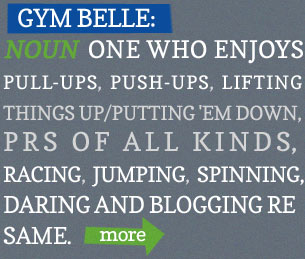An Rx of Their Own?
In a recent CrossFit Journal video entitled Prescribed Scaling for Women, Tony Budding and Katie Hogan discuss the oft-noted absence of prescribed weights for women in CrossFit's mainsite WODs. The topic is a somewhat controversial one in the CrossFit community, and these discussions tend to be punctuated by accusations of sexism flung in both directions. Inflammatory rhetoric aside, this debate actually raises some interesting questions about how women approach CrossFit, and I'd like to share my thoughts on the topic.
Men are stronger than women. That disparity is more pronounced in the upper body, but it is significant throughout. It's certainly true that some women are stronger than a heck of lot of men, but, on average, men are considerably stronger.
When CrossFit designs workouts and posts them on its daily blog, there is one "prescribed" weight - and it's selected with the fittest men in mind. (Some claim the numbers are unisex; I think they speak for themselves.) The expectation is that athletes will either do the workout as prescribed, or scale it down to accomodate their abilities and training needs. CrossFit does not prescribe a weight for women for mainsite WODs. In fact, the only time that CrossFit specifies a women's weight for a workout is in competitions. Many individual gyms actually do specify an Rx'd women's weight for their athletes (typically about 2/3 of what the men are doing), but CrossFit doesn't endorse this practice.
"Rx'd" has real cache in the CrossFit world. Doing a WOD as it is prescribed is perceived and treated as an accomplishment. Merely by way of example, my affiliate, CrossFit Metropolis, sells shirts that say "As Rx'd" on the back, and at our last Fight Gone Bad competition, we gave out certificates for, among other things, completing the WOD as Rx'd. If doing a WOD as Rx'd is the goal, or even a goal, then setting a standard that is significantly more difficult, if not physiologically impossible, for women to accomplish just isn't cool. Whether or not its intended, the message communicated is that to be truly fit, to truly succeed at this sport, you pretty much have to be male. This is massively demoralizing and undermines the legitimacy of women's accomplishments in the gym. In my mind, the argument in favor of prescribed weights for women boils down to this: success is hugely motivating, and women deserve a comparable opportunity to achieve these milestones. Women are entitled to a target that is equally as attainable for women as the official Rx'd weights are for men.
Arguably, CrossFitters - men and women - are entirely too focused on "Rx'd." Those numbers are intended to be reference points, not status symbols. And just because you can go Rx'd in a given WOD doesn't mean you should. When you're training, you should focus on improving your weaknesses. That might mean stripping some weight off and speeding up. It might mean piling on more pounds. Still, the perception is that Rx'd equals badass, and this isn't likely to change.
One argument I've heard against prescribing women's weights is that it's too hard to do. The two-thirds rule doesn't always work. The weights selected for women would be arbitrary. This is bunk. It shouldn't be that much more difficult to pick a number for women than it is to pick one for men. Yes, women come in all shapes, sizes and strengths, but so do men. It's certainly no less arbitrary. In the interview, much is made over the fact that the elite female athletes keep getting stronger. The same is true for the men, though. Over time, we've seen mainsite prescribe heavier weights for men; no one's suggested that we should stop prescribing weights because of this. That wouldn't make sense.
What's not articulated by Tony or Katie but seems to underlie their more interesting comments is a concern that female athletes would treat Rx'd weights differently than their male counterparts do. There seems to be a concern that women would see their own Rx numbers as absolute limits and not venture beyond them even if they were physically capable of doing so. This is interesting. It wouldn't totally surprise me if women were actually more ambivalent about reaching the Rx'd weights, or more likely to categorize themselves as capable of "something less than Rx'd" regardless of what that Rx number is. If that were true, then the absence of a lower target for women might actually foster greater strength gains. It's a fascinating theory. If someone were to really study this, perhaps I'd be convinced that prescribed weights for women would actually be counterproductive.
In the end, I don't think there's an urgent need for official prescribed weights for women because most of us really do put stock in the unofficial numbers. (When I do Fran at 65lbs, you'd better believe I'm saying I did it as Rx'd!) But doesn't that speak volumes about what the community believes is most effective? I won't claim to have exhausted the literature, but what I've read so far has failed to convince me CrossFit's really got this one right.
My perspective is arguably different than Katie and Tony's. I'm no elite athlete. Those "unofficial" women's Rx'd weights are, for the most part, still years away for me and the men's weights are utterly unfathomable. Maybe if they weren't, I'd feel differently. I don't know.
So I'm curious, what do you think?
-Gym Belle-







 Post a Comment
Post a Comment



Reader Comments